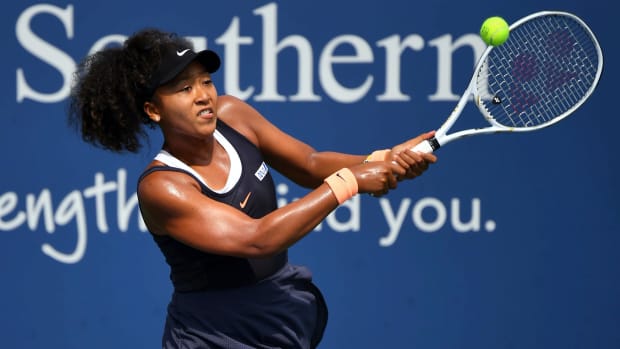After a one-day break in the tournament prompted by her decision to speak out, Naomi Osaka reached her first Western & Southern title match following a win over Elise Mertens.
NEW YORK — After two days of little sleep and unexpected stress, Naomi Osaka rose to the moment.
The two-time Grand Slam champion returned to the court after bringing the push for racial justice to the forefront on the tennis tour, and she advanced to the finals of the Western & Southern Open on Friday with a straight-set victory.
This one meant a lot.
“Of course I feel extra pressure now that there’s more eyes watching me,” she said.
After a one-day break in the tournament prompted by her decision to speak out, Osaka reached her first Western & Southern title match by gritting out a 6-2, 7-6 (5) victory over Elise Mertens.
The 22-year-old Osaka was hoping someone else in tennis would take the lead in speaking up for racial justice — she considers herself more of a follower — but realized she would have to make the first step. She acknowledged that it was “a bit frightening” to get so much attention the last two days, given how she prefers to stay in the background.

“I feel like it’s been kind of hectic and I honestly haven’t been able to get that much sleep yesterday, so I was glad to win today,” she said.
Osaka tweeted after her semifinal victory that she was exhausted and “sick to my stomach” over the many Black people killed by police. She had decided to withdraw from the tournament as a statement in support of racial justice, joining athletes in other sports.
Other tennis players expressed support and the tournament was halted for one day, prompting Osaka to stay in the draw.
Back on court, how would she handle the emotions of the last few days?
“Preparing for this match was a bit stressful,” she said.
Even though her first serve was inconsistent — she made only half of them — the fourth-seeded Osaka fought off 18 of 21 break points while gritting it out.
“I totally respected her decision,” Mertens said of Osaka’s initial withdrawal. “I think it’s great what she does and she’s a role model for tennis. So I totally accept it.”
One alarming moment: Osaka grabbed her left hamstring after chasing a ball during the tiebreaker, but completed the match without pause. Osaka won the 2018 U.S. Open and will be coming off a successful week — in many ways — heading into this one.
The Western & Southern Open was moved from Mason Ohio to the U.S. Open site in Flushing Meadows because of pandemic precautions, creating a two-tournament event without spectators.
Osaka will face resurgent Victoria Azarenka, who beat Johanna Konta 4-6, 6-4, 6-1 to reach the Western & Southern final for the first time since 2013, when she beat Serena Williams.
The 31-year-old Azarenka considered retiring at the start of the year. She lost in the first round at Monterrey and to Venus Williams at Lexington last week.
Azarenka, ranked No. 59, smiled throughout her semifinal and raised her index finger after finishing it off. She has lost only one set this week, showing exuberance over her success.
“I haven’t felt this way in so, so long — probably ever, to be honest,” she said. “That’s what I’m enjoying.”
Top-ranked Novak Djokovic overcame more neck problems and advanced to the finals with a 4-6, 6-4, 7-6 (0) win over Roberto Bautista Agut, who had won their last three head-to-head match-ups on hard courts.
Djokovic won the tournament for the first time in 2018, becoming the first to win all nine ATP Masters 1000 events. Another title would tie him with Rafael Nadal’s 35 Masters titles, most since the series began in 1990.
Djokovic has been bothered during the week by a sore neck, and he got treatment twice during the match on Louis Armstrong Court. He also put his hand on his stomach repeatedly.
After blowing a 5-2 lead in the third set, he served three aces to sweep the tiebreaker.
Djokovic will face Milos Raonic, who beat fourth-seeded Stefanos Tsitsipas 7-6 (5), 6-3 after fighting off a break point in the first set. Djokovic is 10-0 career against the Canadian.
Raonic was one of the first players to publicly support Naomi’s decision to drop out of the tournament.
“It’s not a political thing by any means,” he said Friday. “I think it’s a human right to not have that fear. I hope there’s a chance in the future, and I hope we as athletes can do a small part in that.”

Post a Comment
Thanks For Comment We Will Get You Back Soon.